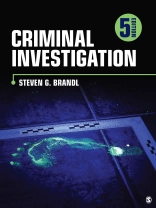Criminal Investigation, Fifth Edition offers a comprehensive and engaging examination of the criminal investigation process and the vital role criminal evidence plays. Written in a straightforward manner, the text focuses on the five critical areas essential to understanding criminal investigations: background and contextual issues, criminal evidence, legal procedures, evidence collection procedures, and forensic science. In the new edition of this bestseller, author Steve Brandl goes beyond a simple how-to on investigative procedures and draws from fascinating modern research, actual investigative cases, and real crime scene photos to give students practical insights into the field of criminal investigation today.
This title is accompanied by a complete teaching and learning package.
สารบัญ
Preface
Acknowledgments
About the Author
Chapter 1. THE INVESTIGATION OF CRIME
Criminal Investigation, Criminal Evidence, and Forensic Science Defined
Types of Criminal Investigations
Perspectives on the Criminal Investigation Process
Mental Mistakes in Criminal Investigations
Criminal Investigation and the Criminal Justice System
Chapter 2. THE HISTORY OF CRIMINAL INVESTIGATION
The Evolution of the Investigative Task: English Developments
American Developments: The First Police Departments and Detectives
American Developments: The Rise of the Professional Police Detective
American Developments: Community Support, Science, and Criminal Investigations
Chapter 3. THE ROLE AND DOCUMENTATION OF EVIDENCE IN CRIMINAL INVESTIGATIONS
The Basics of Criminal Evidence
Types of Evidence
The Functions of Evidence
Documenting Evidence: The Value and Importance of Investigative Reports
Chapter 4. THE LAW AND CRIMINAL INVESTIGATIONS
Basic Legal Terminology
The Rules and Admissibility of Evidence
Constitutional Requirements for the Collection of Evidence: Search and Seizure
Constitutional Requirements for the Collection of Evidence: The Exclusionary Rule
Constitutional Requirements for the Collection of Evidence: Self-Incrimination
Chapter 5. THE CRIME SCENE, FORENSIC EVIDENCE, AND DNA
The Role of Physical Evidence in Criminal Investigations
The Crime Scene and Its Management
DNA
The Collection of DNA
The Science of DNA
The Applications of DNA in Criminal Investigations
Biological Evidence and DNA
Other Types of Forensic Evidence
The Role of Crime Laboratories in Criminal Investigations
Chapter 6. INTERVIEWS AND EYEWITNESS IDENTIFICATIONS
Investigative Interviews
Eyewitness Identifications as Evidence
The Memory Process and the Identification Task
Guidelines for the Collection of Eyewitness Evidence
Investigative Tools in Interviewing
Chapter 7. INTERROGATIONS AND CONFESSIONS
Investigative Interrogations
Prerequisites for Productive Interrogations
Approaches to Investigative Interrogations Explained
Police Deception in Reid Technique Interrogations
Why Do Suspects Confess, or Falsely Confess?
Investigative Tools in Recognizing Suspects’ Deception
Chapter 8. BEHAVIORAL EVIDENCE AND CRIME ANALYSIS
Behavioral Evidence Analysis and Criminal Profiling Defined
Criminal Profiling: The Basics
Criminal Profiling: The Details
Geographic Profiling
Psycholinguistics
Crime Analysis
Chapter 9. DIGITAL EVIDENCE
Digital Evidence Defined
Evidence From Smartphones
Evidence From Other Electronic Devices
Issues in the Collection of Digital Evidence
Chapter 10. INFORMATION FROM SOCIAL MEDIA, THE PUBLIC, VIDEO, INFORMATION NETWORKS, AND OTHER SOURCES
Information From the Public in Criminal Investigations
Video as Evidence in Criminal Investigations
Social Media as a Source of Evidence in Criminal Investigations
Confidential Informants as a Source of Evidence in Criminal Investigations
Gang Intelligence in Criminal Investigations
Electronic Networks as a Source of Evidence in Criminal Investigations
Psychics
Chapter 11. DEATH INVESTIGATION
Issues in the Investigation of Death: Manner of Death
Patterns and Characteristics of Homicide
Investigative Considerations With Death and Homicide
Major Challenges in Homicide Investigations
Chapter 12. THE INVESTIGATION OF SEX CRIMES, ASSAULT, DOMESTIC VIOLENCE, AND CHILD ABUSE
Varieties and Characteristics of Rape and Other Sexual Assaults
Investigative Considerations With Rape and Other Sexual Assaults
Varieties and Characteristics of Other Assaults
Investigative Considerations With Other Assaults
Domestic Violence and Child Abuse
Chapter 13. THE INVESTIGATION OF ROBBERY
Varieties and Characteristics of Robbery
Eyewitness Identifications, Alarms, and Video Evidence
Modus Operandi
Physical and Digital Evidence
Other Evidence in Robbery Investigations
Chapter 14. THE INVESTIGATION OF BURGLARY, VEHICLE THEFT, ARSON, AND OTHER PROPERTY CRIMES
The Investigation of Burglary
Sources of Evidence in Burglary Investigations
The Investigation of Arson
The Investigation of Larceny
Chapter 15. THE INVESTIGATION OF FRAUD AND CYBERCRIME
Fraud and Its Investigation
Identity Theft
Check and Credit/Debit Card Fraud
Telephone Scams
Prescription Drug Fraud
Varieties of Cybercrimes and Their Investigation
Child Pornography
Chapter 16. THE PRESENTATION OF EVIDENCE
The Adversarial Process
Errors in Justice Outcomes
The Value and Importance of Investigative Testimony
The Cross-Examination
Chapter 17. TERRORISM, TECHNOLOGY, AND THE FUTURE OF CRIMINAL INVESTIGATION
Varieties and Characteristics of Terrorism
Technology as a Demand on Law Enforcement
A New Approach to Criminal Investigations: Intelligence-Led Policing
The New Technology of Criminal Investigation
เกี่ยวกับผู้แต่ง
Steven G. Brandl (Ph.D., Michigan State University, 1991) is a professor in the Department of Criminal Justice at the University of Wisconsin – Milwaukee. Professor Brandl teaches numerous graduate and undergraduate courses including Criminal Investigation, Police Management, and Issues in Police Practice and Policy, among others. His research interests include police use of force, the hazards of police work, and criminal investigation.He has conducted research projects and consulted with numerous major metropolitan police departments, including the Milwaukee Police Department and the Chicago Police Department, as well as many suburban police departments. Besides this textbook, he is the author of Police in America (Sage, 2018), numerous articles in professional journals, co-editor of The Police in America: Classic and Contemporary Readings and Voices From the Field, and a frequent presenter professional conferences.












